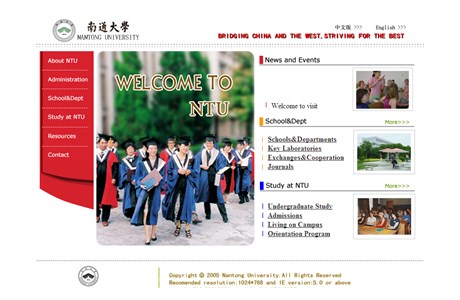Nantong University

Nantong University is a prominent public university located in Nantong, Jiangsu Province, China.
This prominent Chinese university's history stretches back to 1912, predating its current form established in 2004. Its roots lie in three distinct institutions reflecting the needs of a burgeoning modern China. The Nantong Medical Specialized School, founded by the visionary industrialist and educator Zhang Jian, was one of the earliest medical colleges in the country. It embodied Zhang Jian's belief in education as a cornerstone of national progress. Another pillar of the university's foundation is the Nantong Textile Specialized School, also established by Zhang Jian in 1912. This institution addressed the growing need for skilled professionals in China's burgeoning textile industry. The third leg of the university's legacy comes from the Nantong Normal College, founded in 1958. This institution focused on nurturing talented educators to guide future generations. In 2004, these three institutions with their rich and complementary histories merged to form the current comprehensive university. This merger brought together expertise in medicine, science, technology, and education, creating a powerhouse for well-rounded learning. The university continues to honor the legacy of its founders, emphasizing practical application of knowledge alongside theoretical understanding.
Campus life at this university is vibrant. Students can immerse themselves in a variety of activities, from academic clubs and societies to cultural events and sports teams. The picturesque campuses, with their gardens and lakes, provide a beautiful backdrop for student life. Looking forward, the university aspires to be a leader in research and education. It aims to develop future generations of well-rounded individuals equipped with the skills and knowledge to navigate the challenges of the modern world. It also places a strong emphasis on collaborating with local communities and contributing to the region's development.
University Profile
Get a quick snapshot of the university's key details.
| University Name | Nantong University |
|---|---|
| Name in Local Language | 南通大学 |
| Year Established | 1912 |
Location
The university is located in Nantong, Jiangsu Province. Find the address of the university below.
| Address | 9 Seyuan Road, Nantong, Jiangsu Province, China |
|---|
Contact
Connect with the university easily! Find their contact details.
| Phone | +86 (513) 85012131 |
|---|---|
| Fax | +86 (513) 85012130 |
| Website |

|
| Click here to send email | |
| More Links |
Admission Info
Find information below on admission to Nantong University.
| Student Body | Men and Women |
|---|
Scholarship and Financial Aids
There is no information found on scholarships or financial aids offered by Nantong University. You may like to visit their website for more details.
Programs and Courses
Get a quick overview of programs and courses offered at this university.
| Bachelor's Degrees | Master's Degrees | Doctorate Degrees | Diplomas | |
|---|---|---|---|---|
| Arts & Humanities | n/a | n/a | ||
| Business & Social Sciences | n/a | n/a | n/a | |
| Engineering | n/a | |||
| Language & Cultural Studies | n/a | n/a | n/a | |
| Medicine & Health | n/a | |||
| Science & Technology | n/a | n/a |
Click on the following button to explore a detailed list of programs and courses of this institute.
View Course ListRelated Articles
Stay informed with the following article related to the university or higher education in China.
